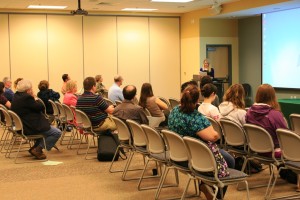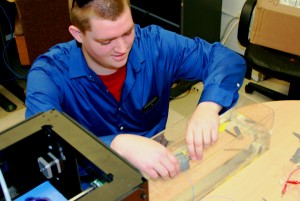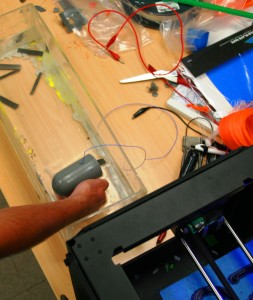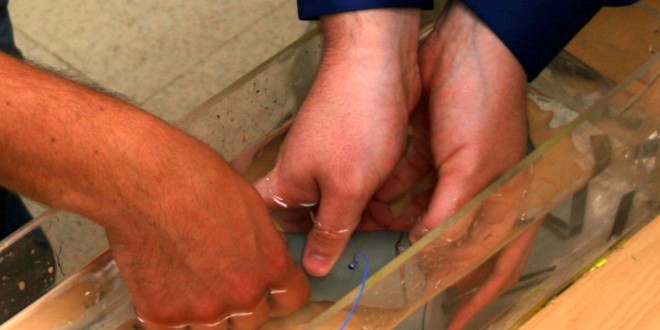Jacksonville University’s 2015 Faculty & Student Symposium this Monday through Wednesday, April 6-8, features results from more than 100 projects, with topics including building a fish robot to gather data; Ebola; adolescent sports injuries; Ponzi schemes; improving first-graders’ behavior through exercise; finding missing planes using mathematics, geometry and fuel capacity research; improvement and government oversight of Unmanned Aerial Vehicles; identifying symptoms of Early Onset Alzheimer’s; social media and cyberbullying; saltwater intrusion into Jacksonville’s freshwater system; and even a 3D-printed ukulele.
 The free symposium (@JUSymposium and #JUSymp2015), which runs from 8 a.m. to 5 p.m. each day in the JU Davis College of Business Conference Rooms B and C, spotlights the excellence of JU students and faculty who engage in cutting-edge research in intriguing topics across a range of disciplines (see a .pdf of the full schedule here).
The free symposium (@JUSymposium and #JUSymp2015), which runs from 8 a.m. to 5 p.m. each day in the JU Davis College of Business Conference Rooms B and C, spotlights the excellence of JU students and faculty who engage in cutting-edge research in intriguing topics across a range of disciplines (see a .pdf of the full schedule here).
Students and the community can stop by DCOB any time during the event and learn about JU’s exciting research, teaching, service, study abroad and internships, said Dr. Brian Lane, Chair of the Symposium Committee.

“The Symposium is always an amazing event in which the entire campus community comes together to share and celebrate each other’s work,” he said. “It’s a true interdisciplinary, liberal arts environment in which students and faculty from every discipline learn from each other.”
Many of the presentations will later be delivered at national conferences such as the National Conference on Undergraduate Research, or lead to papers submitted for publication, so the feedback presenters receive at the Symposium is vital to the further development of their work, he added.
“For many students, their Symposium presentations show the culmination of months or years of hard work becoming well-rounded professionals in their fields. For the faculty, it’s a chance to present their own varied interests and reconnect with each other during a busy time of the academic year.”
Another great feature of the Symposium is that professors and students present side by side, sometimes even co-presenting, Lane noted.
JU President Tim Cost and Provost and Chief Academic Officer Dr. Wenying Xu will offer remarks, and Undergraduate Research Fund awards will be announced.
This year’s Symposium Planning Committee included Dr. John Buck, Dr. Laura Chambers, Dr. Teri Chenot, Dr. Janet Haavisto, Dr. Jesse Hingson, Dr. W. Brian Lane, Prof. Ed McCourt and Dr. Chris Robertson. The 2015 Symposium is funded by ECHO: JU’s experiential learning program.
Follow the Symposium on Twitter (@JUSymposium) and Tweet about it using hashtag #JUSymp2015.
 Wave Magazine Online Jacksonville University News Hub
Wave Magazine Online Jacksonville University News Hub
